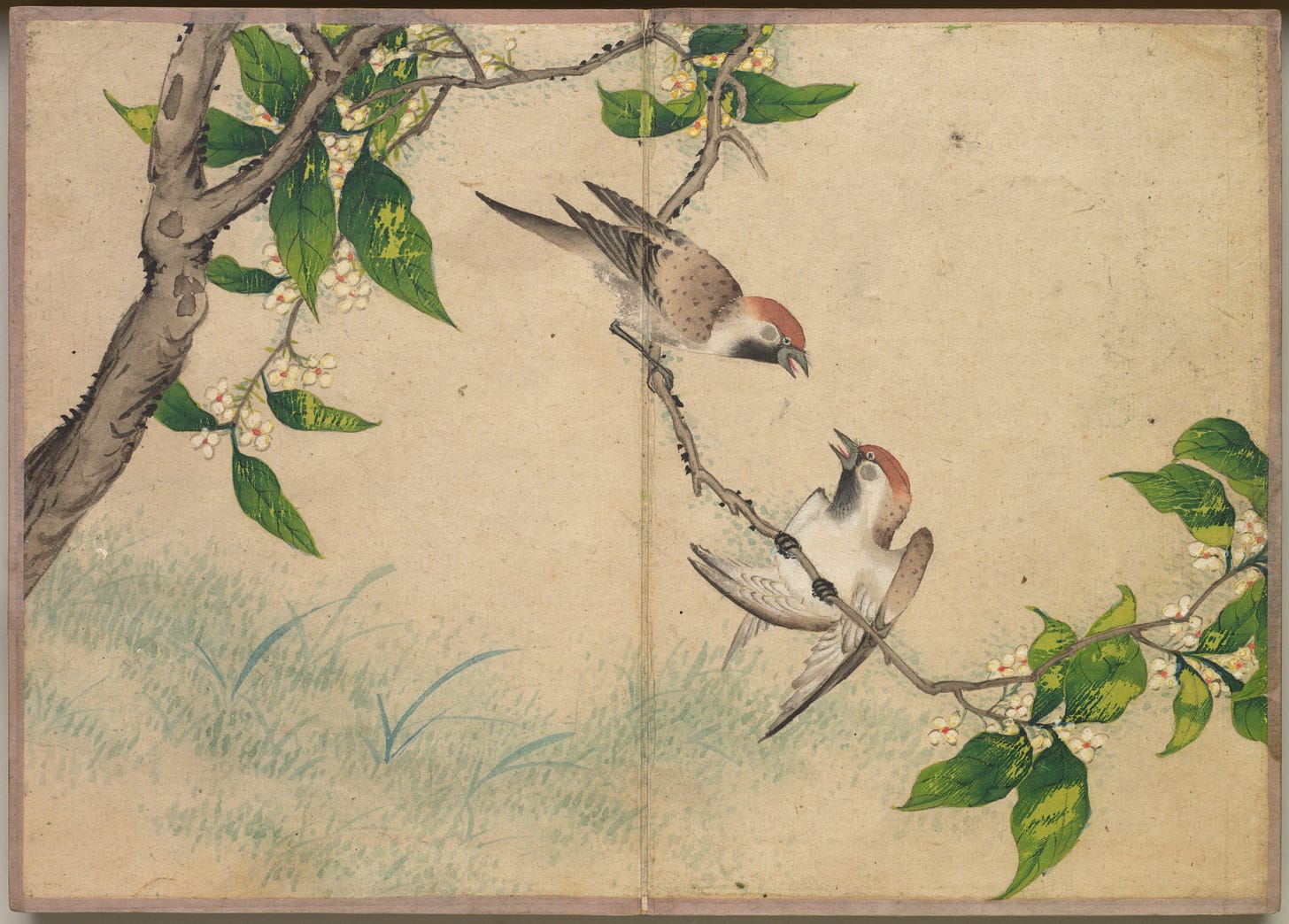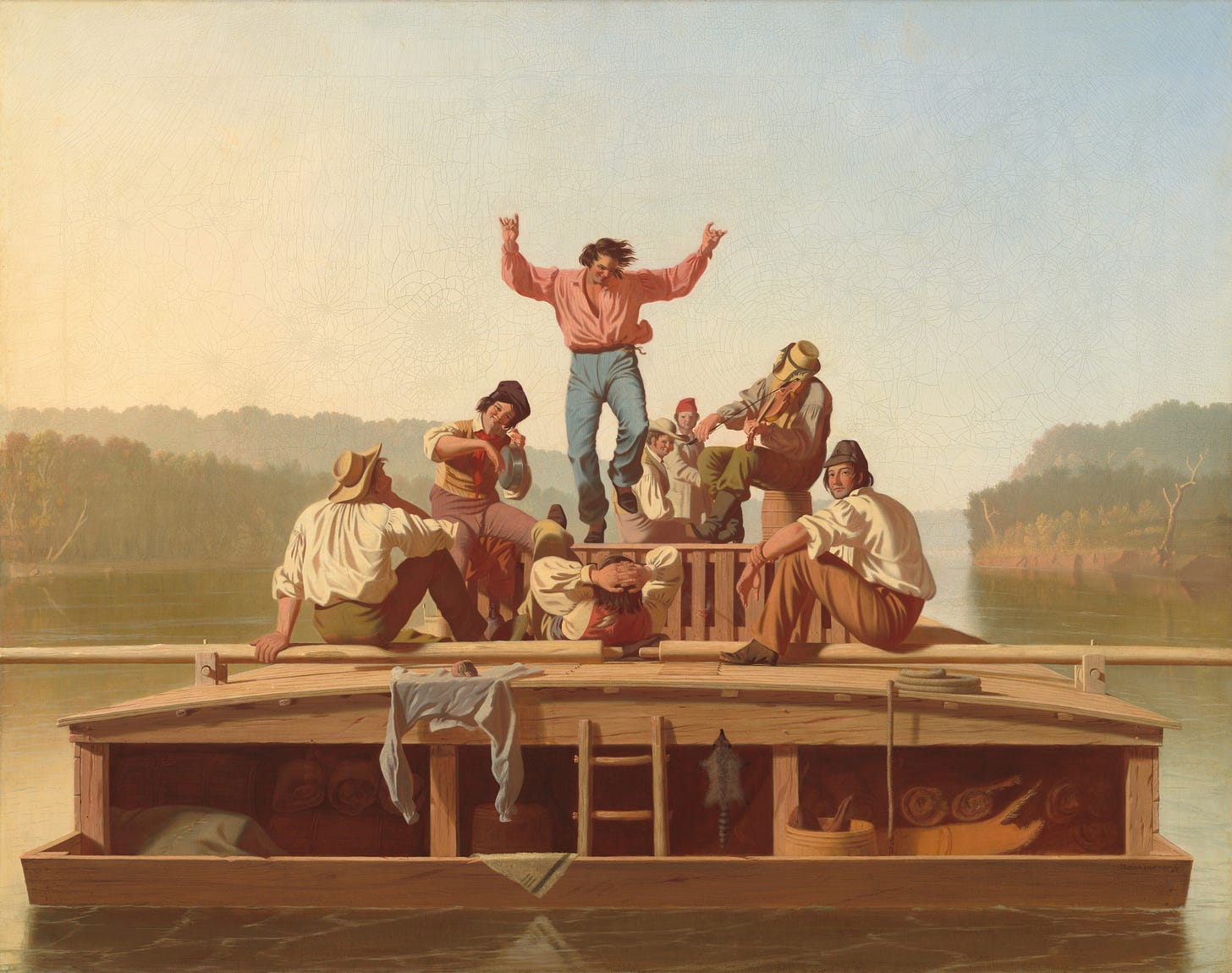Extracts
On Friendship
Selected from the Spring 2021 issue of Lapham's Quarterly.

Friendship is a mysterious and ocean-bottom thing. Who can know the outer ranges of it? Perhaps no human being has ever explored its limits.
—Zora Neale Hurston, 1942
The bird, a nest; the spider, a web; man, friendship.
—William Blake, c. 1790
Friendship at its most elevated—unselfish, thoughtful, egalitarian—should ideally serve as the model for a larger social good, as a standard of how we, as a society, ought to treat one another. If we were to see every suffering as the suffering of a friend, every loss, every deprivation and injustice as something befalling a friend, wouldn’t that radically rearrange—and humanize—the social order? So far it hasn’t happened; likely we will never know.
—Francine Prose, 2021
Perfect friendship is the friendship of men who are good and alike in virtue; for these wish well alike to each other qua good, and they are good in themselves…This kind of friendship, then, is perfect both in respect of duration and in all other respects. In it, each gets from each in all respects the same as, or something like what, he gives. This is what ought to happen between friends.
—Aristotle, c. 330 BC
Without friends even the most agreeable pursuits become tedious.
—Thomas Aquinas, c. 1267
A principal fruit of friendship is the ease and discharge of the fullness and swellings of the heart which passions of all kinds do cause and induce.
—Francis Bacon, 1625
I once had a friend whose intentions toward me became ignoble…When his feelings toward me changed, he divulged all that he had got to know about me.
—Ibn Hazm, c. 1022
Friendship is often destroyed by opposition of interest, not only by the ponderous and visible interest which the desire of wealth and greatness forms and maintains but by a thousand secret and slight competitions, scarcely known to the mind upon which they operate.
—Samuel Johnson, 1758
Anyone thinking of his own interests and seeking out friendship with this in view is making a great mistake. Things will end as they began; he has secured a friend who is going to come to his aid if captivity threatens: at the first clank of a chain, that friend will disappear. These are what are commonly called fair-weather friendships.
—Seneca, c. 62
Under the magnetism of friendship, the modest man becomes bold, the shy confident, the lazy active, or the impetuous prudent and peaceful.
—William Makepeace Thackeray, 1848
There can be no friendship where there is cruelty, where there is disloyalty, where there is injustice. And in places where the wicked gather, there is conspiracy only, not companionship; these have no affection for one another; fear alone holds them together; they are not friends, they are merely accomplices.
— Étienne de La Boétie, c. 1552
Friendship (as the ancients saw) can be a school of virtue, but also (as they did not see) a school of vice. It is ambivalent. It makes good men better and bad men worse.
—C. S. Lewis, 1960
Friends are ourselves.
—John Donne, 1603

We cannot tell the precise moment friendship is formed. As in filling a vessel drop by drop, there is at last a drop which makes it run over; so in a series of kindnesses there is at least one which makes the heart run over.
—James Boswell, 1777
Seven years would be insufficient to make some people acquainted with each other, and seven days are more than enough for others.
—Jane Austen, 1811
As matron and mistress will differ in temper and tone, so will the friend be distinct from the faithless parasite.
—Horace, c. 20 BC
The path of social advancement is, and must be, strewn with broken friendships.
—H. G. Wells, 1905
In real friendship the judgment, the genius, the prudence of each party become the common property of both.
—Maria Edgeworth, 1787
Be courteous to all but intimate with few, and let those few be well tried before you give them your confidence.
—George Washington, 1783
Even where the affections are not strongly moved by any superior excellence, the companions of our childhood always possess a certain power over our minds which hardly any later friend can obtain.
—Mary Wollstonecraft Shelley, 1818
To find a friend, one must close one eye. To keep him—two.
—Norman Douglas, 1917
Friendships begin with liking or gratitude—roots that can be pulled up.
—George Eliot, 1876
We cherish our friends not for their ability to amuse us but for ours to amuse them.
—Evelyn Waugh, 1963
Friends are fictions founded on some single momentary experience.
—Ralph Waldo Emerson, 1864
My friends have made the story of my life. In a thousand ways, they have turned my limitations into beautiful privileges and enabled me to walk serene and happy in the shadow cast by my deprivation.
—Helen Keller, 1903
Friendship was given by nature to be an assistant to virtue, not a companion to vice.
—Cicero, c. 45 BC

No real friendship without absolute liberty.
—George Sand, 1866
Of my friends, I am the only one I have left.
—Terence, 161 BC
I am weary of friends, and friendships are all monsters.
—Jonathan Swift, 1710
With friends that we already have, we can deliberate and decide upon all matters together—but first we must deliberate and decide upon our friends.
—Matteo Ricci, c. 1595
Nothing so fortifies a friendship as a belief on the part of one friend that he is superior to the other.
—Honoré de Balzac, 1847
A friend in power is a friend lost.
—Henry Adams, 1905
There is no wilderness like a life without friends. Friendship multiplies blessings and minimizes misfortunes; it is a unique remedy against adversity and it soothes the soul.
—Baltasar Gracián, 1647
True friendship withstands time, distance, and silence.
—Isabel Allende, 2000
If everyone knew what they all said about each other, there would not be four friends left in the world.
—Blaise Pascal, c. 1660
Friend! It is a common word, often lightly used. Like other good and beautiful things, it may be tarnished by careless handling.
—Harriet Jacobs, 1861
Friendship, like all truth, delights in plainness and simplicity, and it is the counterfeit alone that needs ornament and ostentation.
—James Madison, 1773
Have no friends not equal to yourself.
—Confucius, c. 500 BC
The dead being the majority, it is natural that we should have more friends among these than among the living.
—Samuel Butler, c. 1900


